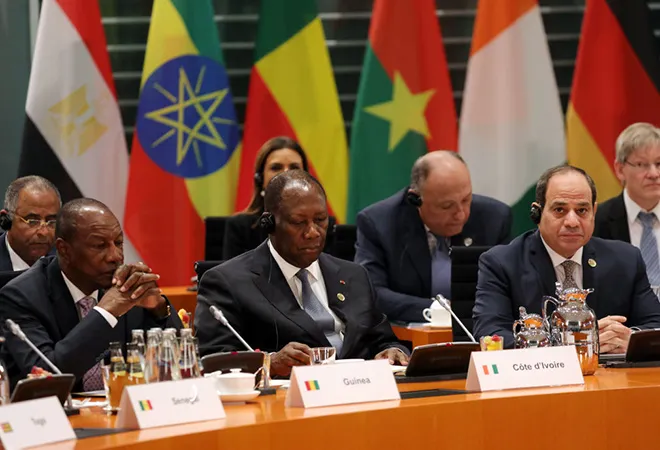-
CENTRES
Progammes & Centres
Location
In its efforts to be the voice of the Global South, India has continued to push for an African Union seat at the G20 during its presidency

As we celebrate 76 years of India’s independence and its achievements as a nation, we must also reflect on what India’s independence meant for the world. With the end of WWII, the colonial order lost its force, advocates of colonial rule dwindled, and decolonisation was evident. Indian nationalists viewed India’s struggle for independence as part of the global movement against colonialism. Mahatma Gandhi believed that India’s independence would be incomplete while the nations of Africa were under colonial rule. As a newly independent country, India was aware of its responsibility and keen to play a special role in international politics. The country strived to provide moral and financial support to African countries fighting against colonisation and used various platforms including the United Nations General Assembly to highlight the ills of colonialism.
As a newly independent country, India was aware of its responsibility and keen to play a special role in international politics.
Despite its massive development challenges, India launched its development cooperation programme only two years after its independence. The founding principles of India’s development cooperation were anti-colonialism, sharing of development experience, and ‘third world’ solidarity. These principles were of great normative significance at the time because the post-war global aid landscape was largely dominated by the West, which was primarily geared towards perpetuating unequal relations between the Global North and the Global South. African countries have been major beneficiaries of India’s capacity-building initiatives and the continent continues to enjoy a special place in India’s foreign policy. In his 2018 address at the Ugandan Parliament, Prime Minister Narendra Modi declared that Africa is at the top of India’s priorities.
India@76 is one of the leading economic powers of the world and the country has lifted millions out of poverty in recent decades. Africa, on the other hand, is home to the world’s youngest population with important innovations in fintech and infinite growth opportunities. However, significant challenges remain. In other words, the economic emancipation of India and Africa is a work in progress. Most African countries have been hit hard by the COVID-19 pandemic and the outbreak of the Ukraine-Russia conflict has completely derailed the achievement of the Sustainable Development Goals (SDGs). Unlike the developed nations, most African countries did not have the fiscal space to provide massive stimulus packages to protect their populations from the economic consequences of the pandemic and the subsequent containment measures. Several studies point that Africa will suffer long-term economic consequences on account of the pandemic due to much slower economic growth rates and altered patterns of international economic relations. According to the Africa Sustainable Development Report 2022, most African countries are not on track to achieve the SDGs and the pandemic reversed many of the development gains made in the last decade. The Ukraine-Russia conflict dealt a death blow to a continent that was already battered by the pandemic. Many African countries are experiencing extreme food insecurity as they were heavily dependent on food and fertiliser imports from Russia and Ukraine.
Most African countries have been hit hard by the COVID-19 pandemic and the outbreak of the Ukraine-Russia conflict has completely derailed the achievement of the Sustainable Development Goals (SDGs).
Sadly, Africa continues to be marginalised at the international level. The continent has too little say in institutions like the International Monetary Fund (IMF) and the World Bank, which are dominated by the creditor countries. Africa only received 5 percent (US$33 billion) of the US$650 billion Special Drawing Rights issued by the IMF in 2021. African leaders are now also confronted with prospect of reduced concessional lending from the International Development Association, the development arm of the World Bank, in the next two years. Moreover, the continent is increasingly competing with Ukraine and Moldova, countries that would not normally qualify for concessional finance, for resources. Nearly half of the World Bank’s new crisis facility is likely to be directed towards these countries. In 2022, global bilateral aid rose by 15 percent but Sub-Saharan Africa witnessed an 8-percent decline in real terms as much of the aid is going to Ukraine and being spent domestically in hosting Ukrainian refugees.
Through its G20 presidency, India has called for a democratisation of global governance institutions and the global financial system. One of the hallmarks of India’s G20 presidency has been its forceful support for an African seat at the G20. Currently, South Africa is the only African country in the grouping. India’s push for an African Union (AU) seat in the G20 is in line with India’s policy of supporting Africa in international forums. The inclusion of the AU in the G20 will lead to greater representation of the African continent and prioritisation of African economic and development issues at the G20 level. The European Union’s (which is represented by the European Commission and the European Council) G20 membership provides a precedent for AU’s membership as both the EU and AU serve similar purposes. Full-fledged membership for the African Union at the G20 will not only help Africa contribute to deliberations on issues that directly affect the continent, but also improve the credibility of the G20, which would then come to represent about 80 percent of the global population as against the current 60 percent.
Malancha Chakrabarty is Senior Fellow and Deputy Director (Research) at the Observer Research Foundation
The views expressed above belong to the author(s). ORF research and analyses now available on Telegram! Click here to access our curated content — blogs, longforms and interviews.

Dr Malancha Chakrabarty is Senior Fellow and Deputy Director (Research) at the Observer Research Foundation where she coordinates the research centre Centre for New Economic ...
Read More +